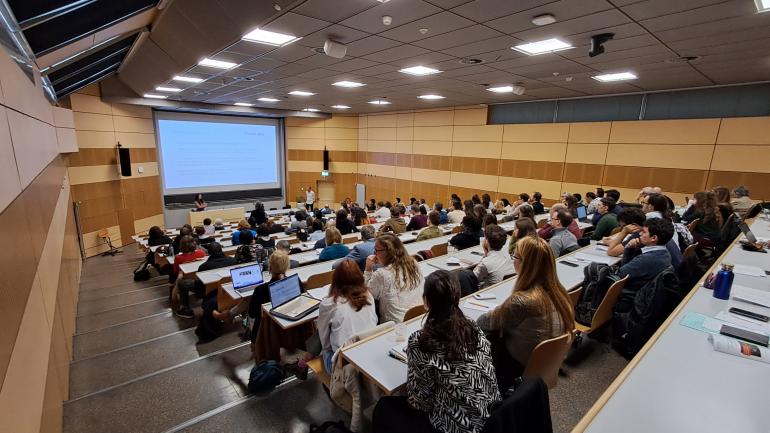
On 5 and 6 November 2024, 160 researchers gathered at the University of Geneva to present their research on mobility in the life course. Organised by the LIVES Centre and the NCCR on the Move, this international conference encouraged fruitful exchanges between researchers from 18 countries and 85 institutions. Sonia Petrini (UNIL), Hill Kulu (University of St Andrews) and Dominik Hangartner (ETH Zurich) led the plenary sessions. A total of 75 presentations and 12 posters were presented over the two days. At the end of the event, the prize for best poster was awarded to Vasilena Lachkovska for her research into the perception of foreign names in Switzerland.
Sonia Petrini launched the programme with her lecture "How polygenic indices help us to understand inequality of opportunity". This doctoral student in sociology at the University of Lausanne measured the influence of polygenic indices and observed aptitudes on life opportunities such as the number of years of education, income and employment. Although genetics partly explains some of these results, life opportunities depend mainly on our social context. Furthermore, biology can inform us about our notion of social justice and provide new elements for greater equality of opportunity.
Hill Kulu, Professor of Human Geography and Demography at the University of St Andrews (UK), closed the first day with a lecture entitled 'Family and Employment Trajectories among Immigrants and Their Descendants in Europe'. He showed that the family and employment trajectories of migrants vary considerably in the first generation, depending on the country of origin. Differences between nationalities remain significant in the second generation, but are tending to diminish.
Dominik Hangartner, Professor of Public Policy and Co-Director of the ETH Zurich Immigration Policy Laboratory, gave the final lecture of the event with his presentation "The intergenerational effects of forced migration on human capital": in Finland, the children of people who underwent forced migration after the Second World War have a better education and a higher income than natives of the same generation. This is because people who were forcibly displaced by natural disasters, for example, subsequently settled in urban centres offering better opportunities.
Videos: See Sonia Petrini's full presentation / See Hill Kulu's full presentation / See Dominik Hangartner's full presentation
Young researchers encouraged to show their work
On Tuesday afternoon, twelve young researchers presented their research posters to the participants, giving them an opportunity to hear the opinions of more experienced researchers. A panel of judges assessed all the posters and awarded the prize for best poster 2024 to Vasilena Lachkovska, a doctoral student in sociology at the University of Lausanne, for her poster "Same country, different language, different perception? Evidence from a name survey experiment in Switzerland". Congratulations to her!

